Six Pitfalls to Steer Clear of in Your B2B Tech Event Marketing Strategy

2 minute read.
With its unique ability to create impactful touch-points with prospects, event marketing has long been a critical element in the B2B technology marketer's playbook. Indeed, few tactics are as effective for converting prospects into bona fide customers.
However, with great rewards comes substantial investment, making the stakes in event marketing high. That said, it's crucial to identify potential pitfalls and navigate around them strategically. Here are six common mistakes to avoid:
Obsessing Over Registrations or Attendees
The temptation to get swayed by the headcount is real. But remember, volume does not necessarily translate to success. The key lies in the conversion rates, not in vanity metrics. Track the number of attendees transitioning to the next stage in the sales funnel instead of merely counting the audience.
Sticking to a Single Event Type
Every event type offers unique benefits. While large expos increase brand visibility, roundtable discussions facilitate more intimate and high-level engagement. A robust event strategy should thus encompass a variety of event types to effectively pull your prospects through the sales funnel.
Over-reliance on Self-hosted Events
While hosting your own events can seem cost-effective and offer greater control, it also limits your reach to your existing network. Plus, it can be labour-intensive. Ensure to strike a balance between in-house and external events for a more diverse and expansive reach.
Excessive Dependence on External Events
Just as with self-hosted events, leaning too heavily on external events can lead to lost opportunities for closer engagements. Amid the bustle of large expos and conferences, your voice may get drowned. If hosting events feels daunting, consider engaging an agency like Clutch to manage the process while still capitalising on the benefits.
Lack of a Coherent Event Strategy
Every event you invest in should align with your overarching marketing strategy. Randomly participating in events might dilute your efforts and resources. Ensure every event contributes meaningfully to your target audience's engagement and movement through the sales funnel.
Failing to Measure Event ROI
It's crucial to meticulously track the impact and ROI of all events. Whether it's generating Marketing Qualified Leads (MQLs), Sales Qualified Leads (SQLs), or contributing to Account-Based Marketing (ABM) touchpoints, you need to attribute every activity to a tangible return.
In conclusion, a successful B2B technology event marketing strategy is about thoughtfully selecting the right events, focusing on meaningful engagement over sheer numbers, strategic planning, and keeping a keen eye on your ROI. You're setting up your event marketing strategy for success by avoiding these six common mistakes. It's all about quality, not just quantity.
Time to plan your 2h event strategy? Get in touch & we’ll be happy to bounce some ideas around.
Related Posts:






























